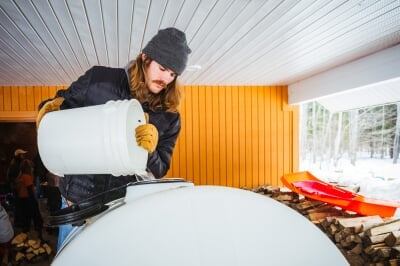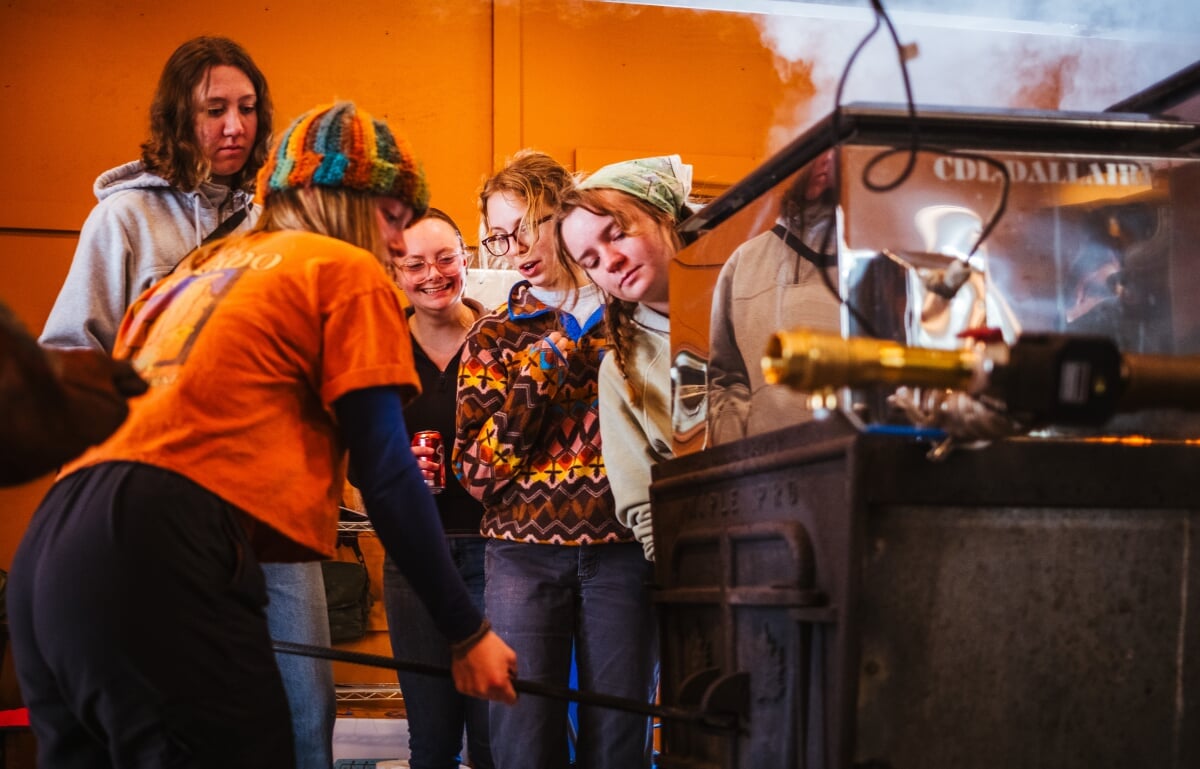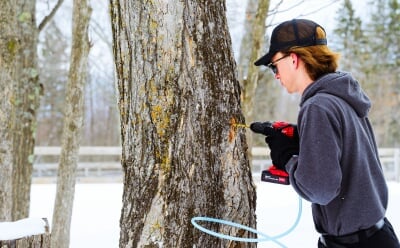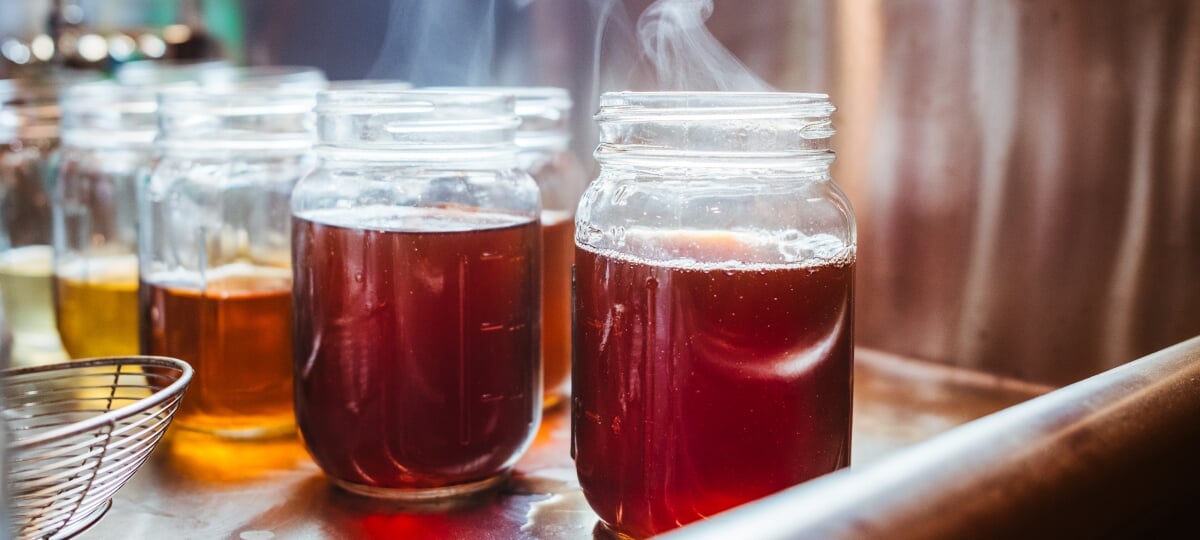Students in Michigan Tech's College of Forest Resources and Environmental Science are tapping into seasonal experiences found in thousands of acres of University-owned forests and coming out with delicious memories — and maple syrup!
Maple syrup making is an Upper Peninsula tradition, and students at Michigan Technological University are taking part. Many Huskies have tapped into Michigan Tech's forests over the decades in search of one of the region's most prized delicacies of spring. Forest health expert Tara Bal, assistant professor in Tech's College of Forest Resources and Environmental Science, began teaching her Maple Syrup Management and Culture class in 2015 at Tech's Ford Center and Forest. Students collected sap from the Ford Research Forest and the village of Alberta, where Bal's class used both a wood-fire evaporator and the traditional Native American method: bringing sap to a boil with fire-heated rocks in a hollowed-out maple log. The class started as an independent study with 19 students its first year and has been full with 40 students every year it has been held since then.
"That's a lot of people to manage in the sugarbush!" said Bal. "I've had students from every college and department on campus in the class. It's great that so many are excited about taking it. It fills up rapidly, within just a few days of registration opening every year."

A 640-acre land donation by the Nara family in 2018 changed the trajectory of maple syrup production on campus. The gift to CFRES included a maple sugar shack previously used for hobbyist syrup production by Robert Nara, and the land was signed over to the University by his wife Ruth Nara with the intent that syrup making would continue on the property. As part of the donation, sugarbush facilities at the Nara Family Forest have been renovated to create an experiential teaching environment.
Bal's class went on hold temporarily as renovations took place, but the updates were well worth the wait. Facilities now include a brand-new sugar shack with a new well and septic field, and new sap storage tanks and tubing equipment. Michigan Tech's Ford Center also added bathrooms to the sugar shack site under supervision of John Carroll, Ford Center maintenance coordinator, to prepare it for group field education events and classes. Renovations were completed in 2024, and maple syrup production for Bal's class moved to the Nara Family Maple Center this spring.
Tap. Sap. Shack. Syrup!
Before heading out to the sugarbush, Bal's class spends the early parts of the semester learning about maple syrup's history and cultural significance. The course also taps into sugarbush ecology, tree physiology and the business side of maple syrup production. Because of the unpredictability of the field season, the course is delivered in a nontraditional online format that allows much-needed scheduling flexibility.
"The reality is that in the springtime, all of our lab work in the field is 100% weather dependent," said Bal. "If we had class scheduled every Monday, Wednesday and Friday at 2 p.m., that could take away a lot of days we would want to be out in the field collecting sap or boiling syrup."
As the long U.P. winter slowly melts away, students transition to hands-on learning; harvesting sap and making syrup with guidance from Bal and the Ford Center's manager of operations, Jim Tolan. Tolan previously supervised students collecting sap as operations manager for the James H. Barrow Field Station at Hiram College, where sap was processed by the Goodell Farm and sold to support efforts to fight food insecurity. His first experiences making maple syrup were with his family in Ohio.
"When I started making syrup, we stood outside next to a cauldron over a fire. It was a great family event, but not efficient in any way. Hopefully our process (at Tech) is a little bit more efficient but with the same heartwarming vibe," said Tolan.
The process begins with identifying the right trees to tap — traditionally a sugar maple, although red maple sap can also be used to make syrup. Before the trees wake from their winter slumber, Huskies drill a two-inch hole into the trunk of each tree and insert a spile, a specialized spigot that allows sap to flow out into buckets. The next step is waiting for fickle spring weather to cooperate.

"You want it to be well above freezing in the day and then down below freezing at night," said Tolan. "That cycle of hot and cold causes the trees to move sap and we capture what we can through that little hole as it's on its way up or down."
The taps yield sap with a sugar concentration somewhere around 2% or 3%. In order to turn sap into syrup, Huskies have to remove a large amount of water from the sap, commonly done by boiling it for extended periods of time. This year Bal's class is also experimenting with a reverse osmosis system that removes a lot of water before boiling. Using different methods gives students a broader understanding of the process and variety of ways to make syrup.
"Our mandate is not maximum production," said Tolan. "It's engaging students, teaching people about the process, and getting out into the woods."
In addition to setting taps and collecting sap, students in the class run the evaporator and reverse osmosis machine, filter and process syrup, bottle it and help with cleanup at the end of the season. There is plenty of work to be done, and with 41 students in the class this year, plenty of hands to do it.
Huskies Across Campus Savor Syrup Season
Huskies of all majors are eager to earn their own bottle of syrup — with or without class credit. Robotics engineering major Owen Gorter '27 founded Michigan Tech's Maple Syrup Club this spring with the goal of bringing students together around the hobby of syrup making. The club is open to anyone interested in learning more about it. Members receive a portion of the syrup based on the number of hours they contributed to its creation. Gorter estimates there are around 25 active club members who harvest sap from the Tech Trails. This year they anticipated making just over two gallons of syrup. In the future, as the club grows, they plan on making even more syrup and donating some of it to the Canterbury House.

Several students have joined both the club and the class, including theatre and entertainment technology major Nikki Donnelly '25. Donnelly stumbled onto mention of the club two years ago through the r/MTU subreddit, where Gorter was gauging interest for the club. Donnelly first heard about the Maple Syrup Management and Culture class when Bal appeared as a guest speaker in one of their visual and performing arts courses.
"Between getting out in the woods, meeting new people and the allure of having my maple syrup at the end of the season, I was very interested in joining," said Donnelly.
Michigan Tech Society of American Foresters Forestry Club secretary and forestry major Tristan Walk '26 is also heavily involved in maple sugar activities at Tech. He spent the summer of 2024 identifying maple trees near the sugar shack that were good candidates for tapping. He decided to continue helping with the process as a volunteer this spring.
"The Forestry Club used to make maple syrup," said Walk. "Being able to bring it back in a big way kind of feels like going from zero to a hundred. We have a brand new sugar shack and 110 trees that we can go out and collect sap from."
Flowing into the Future
Delayed gratification is the name of the game for Husky syrup makers this spring. A round of March and April snowstorms delayed maple syrup season. Despite the wait, the class still managed to get 115 taps into the trees around the Nara Family Maple Center. As the weather broke, they expected their taps to yield 30 to 60 gallons of syrup by the end of the season.
"That much syrup is great for an educational showcase," said Bal. "Everyone in the class gets to take a pint or two, plus we are able to sell some to faculty and other students to help raise funds for next year's equipment upgrades, like more taps and new filters."
Next year, Bal will offer her Maple Syrup Management and Culture class as part of Tech's new Essential Education program. She hopes to expand the syrup operation in future years by tapping more trees and running tubing from taps to storage tanks — a practice common on larger syrup farms that cuts down on labor required to carry sap buckets. The beautifully renovated sugar shack, abundance of maple trees and wide student interest have set up Tech's longtime maple syrup tradition for a growing and delicious future.
Michigan Technological University is an R1 public research university founded in 1885 in Houghton, and is home to nearly 7,500 students from more than 60 countries around the world. Consistently ranked among the best universities in the country for return on investment, Michigan's flagship technological university offers more than 120 undergraduate and graduate degree programs in science and technology, engineering, computing, forestry, business, health professions, humanities, mathematics, social sciences, and the arts. The rural campus is situated just miles from Lake Superior in Michigan's Upper Peninsula, offering year-round opportunities for outdoor adventure.






Comments